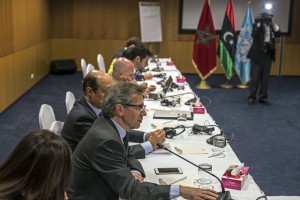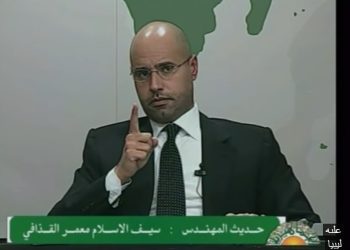By Azza K. Maghur.
Ottawa, 30 June 2015:
The Libyan political dialogue initiated last September . . .[restrict]by Bernardino Leon, the United Nations Special Representative and Head of the United Nations Support Mission in Libya (UNSMIL) has reached the penultimate step to consensus. Four draft agreements have been released thus far, each of which has been subject to comments and objections, resulting in modifications to the evolving document. On Sunday night after another round of meetings in Skhirat, Morocco, certain positive signs were exhibited, to the extent that it was announced that an agreement had been reached and would be initialised.
In a press conference that evening, Salah Mazkhoum, the head of the delegation representing the remnant General National Congress (GNC), announced that his group would be returning to Tripoli to consult with the GNC and anticipated registering objections. Mazkhoum denied reports that the delegation had withdrawn from the dialogue and went on to say that certain gaps were narrowed between “the parties,” referring to the face-to-face meeting between the GNC and the delegation representing the House of Representatives (HoR).
The remnant GNC, currently the political arm of Fajr Libya, the coalition of militias that attacked other militias in Tripoli last July and took control of the city, maintains that it is a parliament, even though Libyan voters replaced it when they elected the HoR in June 2014. The HoR was elected under the auspices of the GNC and the results of the HoR election were announced by the GNC itself.
One should ask: Who are the parties to the Libyan dialogue? And how much can the remnant GNC affect any future agreement?
When the Libyan political dialogue first started in Ghadames in September 2014, the parties involved were an HoR delegation and some of the HoR members who had boycotted the HoR since its first meeting in August 2014. As the dialogue process progressed, its presence widened, with NGO representatives and independent members participating.
It wasn’t until the fourth meeting, five months later in February 2015 again in Ghadames that Mazkhoum and his group joined the dialogue.
Additional dialogue tracks took place in other venues in several countries, involving municipal council members, political parties and activists, women, heads of tribes and, more recently, representatives of militias from the Western side of Libya who met in the city of Misrata, Libya earlier this month.
The expansion of the meetings and participants indicates that despite the pretensions of the remnant GNC, the talks are not between it and the HoR. It is a dialogue of several communities of Libya’s diverse components. Therefore, it is important not to fall into the trap and repeat the misleading narrative that Libya is led by two parliaments and two governments.
The remnant GNC, claims to have 134 members of the original 200 elected. But in reality is far away from reaching this number. It cannot be considered as one of the two parties to the dialogue, as it is diffusing a false image of itself. The parties to the dialogue are multiple and diverse.
They include rival groups such as HoR members and boycotters and representatives of the remnant GNC political parties, political figures and activists and militia leaders. However, others, especially the independent parties, are playing the role of mediators between opponents, namely the HoR and the GNC.
The dialogue has taken too long for a country in chaos and constantly on the verge of total failure. The Libyan people are suffering a collapsing economy and precarious basic needs. Daesh is in total control of some Libyan towns and active in others. Libyan wealth is being depleted as its sovereign funds face legal battles in foreign courts, contributing to the confusion as to who legally represents the country. In such circumstances, a dialogue cannot continue forever and this is the moment at which the opportunity will be either seized or missed.
UNSMIL’s latest proposed agreement is not the best, nor is it the red carpet for the future of Libya and its people. Those who took part in the dialogue, in addition to the UN and the international community, will be responsible for making it work.
The draft agreement that has been hammered out over the months should go through regardless of whether the remnant GNC signs or rejects it, especially since the GNC has no legitimacy save its forceful presence on the ground.
The signature of the remnant GNC would enhance the agreement and give confidence that it can work. However, with two governmental institutions – the existing HoR and the Accord Government to be formed in line with the agreement – international support and security measures laid out in the agreement and its annexes, the agreement will stand.
There is still hope that wisdom will prevail and the remnant GNC will eventually join in signing the agreement.
Libya is bigger than two parties and the dialogue process is not and has never been limited to two parties. It is the dialogue of a nation that has no other choice but to sign and implement an agreement that will hopefully bring stability to the country.
’
Azza K. Maghur is a leading Libyan lawyer, NGO and human rights activist and a former independent member of the General National Congress (GNC) “February Committee” that amended the Transitional Constitutional Declaration enabling the 2014 House of Representatives elections.
[/restrict]





